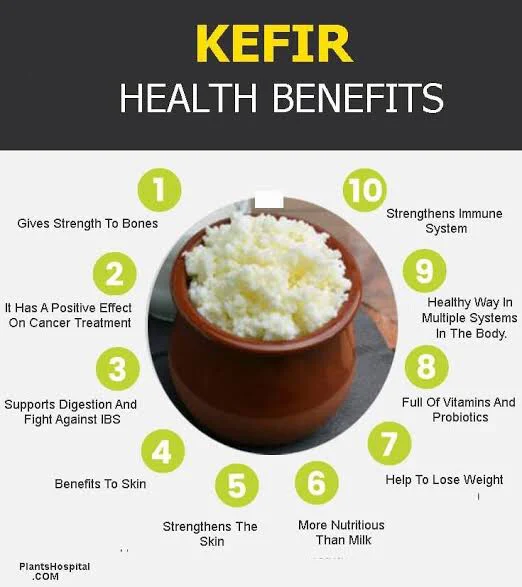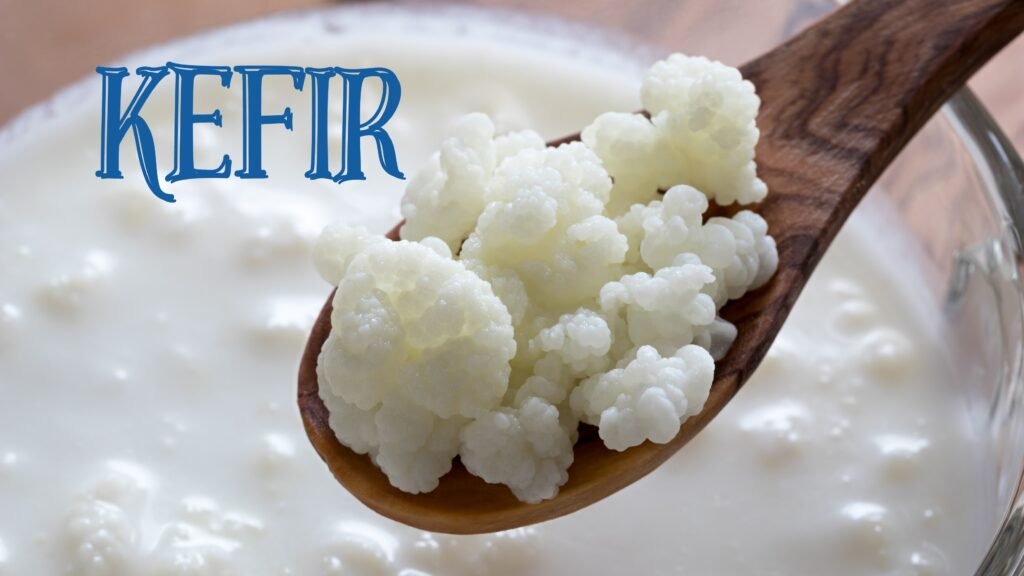
Are you looking for a delicious and nutritious addition to your diet? Look no further than kefir, the fermented superfood that is taking the health world by storm! Packed with essential nutrients and beneficial bacteria, kefir offers a wide range of amazing health benefits that can transform your well-being.
Derived from fermented milk, kefir is known for its probiotic properties, which can promote digestive health and strengthen the immune system. But its benefits don’t stop there. Kefir also boasts high levels of vitamins, minerals, and protein, making it an excellent choice for those looking to enhance their overall nutrient intake.
In addition to its nutritional content, kefir has been shown to have powerful anti-inflammatory properties, aiding in the prevention of chronic diseases such as heart disease and diabetes. It may also improve bone health by increasing calcium absorption and reducing the risk of osteoporosis.
Whether you’re a health enthusiast or simply want to enhance your well-being, kefir is a must-try superfood. Join us as we dive into the fascinating world of kefir and discover the incredible health benefits it has to offer. Get ready to unlock the power of this fermented wonder!
What is kefir and how is it made?
Kefir is a fermented dairy drink that originated in the Caucasus Mountains of Eastern Europe. It has a long and fascinating history, dating back thousands of years. The name “kefir” is derived from the Turkish word “keif,” which means “good feeling,” a testament to the drink’s remarkable health benefits.
Kefir is made by fermenting milk with a unique symbiotic culture of bacteria and yeast, known as “kefir grains.” These grains are not actually grains in the traditional sense, but rather a complex matrix of microorganisms that resemble cauliflower florets. The kefir grains are added to milk, typically cow, goat, or sheep milk, and left to ferment at room temperature for 24-48 hours. During this process, the microorganisms in the kefir grains convert the lactose (milk sugar) into lactic acid, carbon dioxide, and a variety of beneficial compounds, resulting in the distinctive tangy and effervescent flavor of kefir.
The fermentation process not only transforms the milk into a delicious and nutritious beverage but also produces a wide range of probiotics, enzymes, and other beneficial compounds. The specific composition of kefir can vary depending on the type of milk used, the duration of fermentation, and the unique blend of microorganisms present in the kefir grains. This diversity is what makes kefir such a versatile and powerful superfood, offering a multitude of health benefits to those who incorporate it into their diet.

Nutritional value of kefir
Kefir is a nutrient-dense beverage that provides an impressive array of essential vitamins, minerals, and other beneficial compounds. One cup of plain, low-fat kefir contains approximately 100-120 calories, 10-12 grams of protein, and 8-10 grams of carbohydrates, with minimal fat content.
In terms of vitamins, kefir is an excellent source of vitamin B12, which is crucial for red blood cell formation, neurological function, and DNA synthesis. It also contains significant amounts of vitamin A, vitamin D, and various B-complex vitamins, including riboflavin, niacin, and pantothenic acid. These vitamins play vital roles in energy metabolism, immune function, and overall cellular health.
Kefir is also a rich source of minerals, such as calcium, phosphorus, and magnesium. Calcium is essential for maintaining strong bones and teeth, while phosphorus and magnesium work in synergy to support bone health, muscle function, and energy production. Additionally, kefir contains trace minerals like selenium, which is a powerful antioxidant that helps protect cells from oxidative stress.
Beyond its impressive nutrient profile, kefir is unique in its content of beneficial probiotics and enzymes. The fermentation process results in the production of various strains of lactic acid bacteria and yeasts, which are collectively known as the “kefir microbiome.” These probiotics have been shown to have a positive impact on digestive health, immune function, and overall well-being, making kefir a true superfood powerhouse.
Health benefits of kefir for digestion and gut health
One of the most well-known and well-documented benefits of kefir is its positive impact on digestive health and gut function. The probiotic strains present in kefir, such as Lactobacillus and Bifidobacterium, play a crucial role in maintaining a healthy and balanced gut microbiome.
These beneficial bacteria work to improve the integrity of the gut lining, reducing inflammation and supporting the proper absorption of nutrients. Additionally, the probiotics in kefir can help alleviate symptoms of various gastrointestinal conditions, such as irritable bowel syndrome (IBS), inflammatory bowel disease (IBD), and lactose intolerance.
Kefir’s probiotic content can also aid in the prevention and management of diarrhea, both acute and chronic. By restoring the balance of gut flora, kefir can help regulate bowel movements and reduce the risk of pathogenic bacterial overgrowth. Furthermore, the enzymatic activity in kefir can enhance the digestion and absorption of lactose, making it a suitable option for those with lactose intolerance.
Beyond its direct effects on the gut, the probiotics in kefir have been shown to have a positive impact on overall immune function. By strengthening the gut’s barrier function and modulating the immune response, kefir can help reduce the risk of infections and boost the body’s natural defenses against various pathogens.
Kefir as a source of probiotics
Kefir is renowned for its exceptional probiotic content, making it a standout among fermented dairy products. The unique blend of bacteria and yeasts present in kefir grains produces a diverse array of beneficial microorganisms that can have a profound impact on overall health.
The probiotic strains found in kefir include Lactobacillus, Bifidobacterium, Streptococcus, and Leuconostoc, among others. These microorganisms work synergistically to promote a healthy gut microbiome, enhance nutrient absorption, and support various physiological processes.
One of the key advantages of kefir’s probiotic profile is its ability to survive the harsh acidic environment of the stomach and reach the intestines, where they can exert their beneficial effects. Unlike some probiotic supplements that may not withstand the digestive process, the hardy probiotics in kefir are well-equipped to colonize the gut and thrive.
Moreover, the fermentation process used to make kefir results in the production of a diverse array of metabolites, including organic acids, antimicrobial compounds, and bioactive peptides. These byproducts can further contribute to the overall health-promoting properties of kefir, making it a true probiotic powerhouse.
Kefir and its impact on the immune system
In addition to its remarkable effects on digestive health, kefir has also been shown to have a positive impact on the immune system. The probiotic strains present in kefir play a crucial role in modulating the body’s immune response and enhancing its ability to defend against various pathogens.
One of the primary ways in which kefir supports the immune system is by strengthening the gut’s barrier function. The probiotics in kefir help maintain the integrity of the gut lining, preventing the entry of harmful microorganisms and toxins into the body. This, in turn, reduces the risk of infections and supports the overall health of the immune system.
Furthermore, the probiotics in kefir have been found to stimulate the production of various immune cells, such as natural killer cells, T cells, and B cells. These cells play a vital role in the body’s defense against infections, as well as in the regulation of the inflammatory response.
Kefir’s immunomodulatory properties have also been linked to its ability to reduce the risk of chronic inflammatory conditions, such as autoimmune disorders and allergies. The bioactive compounds produced during the fermentation process, including exopolysaccharides and antimicrobial peptides, can help modulate the immune system and mitigate the effects of excessive inflammation.
Kefir for weight management and satiety
Incorporating kefir into your diet may also offer benefits for weight management and satiety. The unique nutritional profile of kefir, along with its probiotic content, can contribute to a range of mechanisms that support healthy weight maintenance.
One of the ways in which kefir can aid in weight management is through its impact on gut health and the microbiome. The probiotics in kefir have been shown to influence the composition of the gut microbiome, which can, in turn, affect the way the body metabolizes and stores fat. By promoting the growth of beneficial bacteria and reducing the prevalence of harmful microorganisms, kefir can help optimize the gut environment and support a healthy weight.
Additionally, the protein content in kefir can contribute to a feeling of fullness and satiety, which may help curb cravings and reduce overall caloric intake. The high-quality protein in kefir is slowly digested, providing a sustained source of energy and helping to keep you feeling satisfied for longer periods.
Furthermore, the calcium and vitamin D present in kefir may also play a role in weight management. These nutrients have been associated with improved body composition and the regulation of energy metabolism, which can support healthy weight maintenance.
Kefir’s potential anti-inflammatory properties
Emerging research suggests that kefir may possess potent anti-inflammatory properties, making it a valuable addition to the diet for individuals seeking to reduce inflammation and support overall health.
The probiotic strains found in kefir have been shown to modulate the inflammatory response by regulating the production of various inflammatory mediators, such as cytokines and chemokines. By promoting a balance between pro-inflammatory and anti-inflammatory signals, kefir can help mitigate the damaging effects of chronic inflammation.
Additionally, the bioactive compounds produced during the fermentation process, including exopolysaccharides and peptides, have been found to possess anti-inflammatory and antioxidant properties. These compounds can help neutralize free radicals, reduce oxidative stress, and inhibit the activation of inflammatory pathways.
Chronic inflammation has been linked to the development of various health conditions, including cardiovascular disease, type 2 diabetes, and certain types of cancer. By incorporating kefir into your diet, you may be able to reduce the risk of these inflammatory-driven diseases and promote overall well-being.
Kefir and its effects on bone health
Kefir’s impressive nutritional profile, particularly its high calcium and vitamin D content, makes it a valuable ally in the pursuit of maintaining strong and healthy bones. The unique combination of these essential nutrients, along with the presence of probiotics, can contribute to enhanced bone health and a reduced risk of osteoporosis.
Calcium is a crucial mineral for the formation and maintenance of bone structure, and kefir is an excellent source of this vital nutrient. One cup of kefir can provide up to 30% of the recommended daily intake of calcium, making it a convenient way to ensure adequate calcium intake.
Vitamin D, on the other hand, plays a crucial role in the absorption and utilization of calcium. The combination of calcium and vitamin D in kefir can work synergistically to promote the mineralization of bones, improve bone density, and reduce the risk of fractures.
Additionally, the probiotics present in kefir have been shown to influence bone metabolism and enhance the bioavailability of calcium. By promoting the growth of beneficial gut bacteria and improving nutrient absorption, kefir can support the body’s ability to effectively utilize the calcium and other bone-building nutrients it provides.
Conclusion: Incorporating kefir into your diet for optimal health benefits
Kefir is a remarkable fermented dairy product that offers a multitude of health benefits, making it a true superfood worth incorporating into your daily routine. From its impressive nutritional profile to its powerful probiotic properties, kefir has the potential to transform your overall well-being.
By enhancing digestive health, boosting the immune system, and supporting weight management, kefir can be a game-changer in your pursuit of optimal health. Its anti-inflammatory effects and positive impact on bone health further solidify its status as a must-have addition to any health-conscious diet.
Whether you enjoy kefir on its own, incorporate it into smoothies, or use it as a versatile ingredient in your cooking, this fermented wonder can be a delicious and nourishing way to support your overall wellness. Embrace the power of kefir and unlock the amazing health benefits it has to offer. Your body will thank you for it!
Also Read: Top 10 Health Benefits of Drinking Kombucha



Pingback: The Ultimate Guide To Kefir: Benefits, Consumption, And More | Tasty Tykes